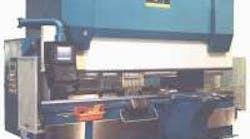Adira is a Portuguese company that is well established in the U.S. Two of its products include this innovative 4-axis laser cutting machine and hydraulic pressbrake.
FIL is Portugal's premiere industrial show. It takes place every other year in Lisbon.
The Portuguese manufacturing industry wants to convey a message to the rest of the world: Portugal offers everything countries strong in manufacturing do. This includes a well-established job-shop base, active trade associations, companies with the capacity to export, and a growing national tradeshow.
It may come as a surprise to some, but Portugal could be considered a jobshop country, with most of its companies producing parts or components for other industries. In fact, the country is the second largest mold supplier for plastics in the world.
It maintains this status even though most of its jobshops are small. In Portugal, a 100-employee company is considered large. Currently, the country has three metalworking companies with over 500 employees; however, most shops have 10 to 15 workers and are located either in the northern or southern parts of the country. Industry is concentrated in three main regions in the north — Porto, Braga, and Aveiro — and two areas in the south — Lisbon and Setubal.
Manufacturing is strengthened by the country's metalworking associations and tradeshows. One of its key associations is AIMMAP, which supports the metallurgical and mechanical engineering industries. The organization represents 1,300 companies and has 28 divisions. Each division acts as a liaison to other European organizations.
When it comes to machine tools, Portugal imports more than it exports, but within AIMMAP's membership are companies with the capacity to export. Most others, though, are supplied by such markets as Germany and Spain.
Three member companies with export capacity are Frezite, Adira, and Mechanica Exacta SA. Frezite produces high-precision tooling. Its products include PCD and CBN-coated tools and HSS cutting tools.
Adira has three facilities and manufactures hydraulic pressbrakes, both upstroking and down-stroking; swing-beam and variable-rake hydraulic shears; and hydraulic presses in double column and single and double-action open-gap designs. Its most recent venture is a laser cutting machine, which it exhibited at EMO 2001.
The new 4-axis machine comes with a 2 or 3-kW Rofin Sinar laser and Siemens controls and linear guides. It cuts up to 16-mm-thick material on a 3 1.5-m table, and the company plans to offer a 4 2-m table.
Adira's main market in the U.S. is the aerospace industry. According to Ana Maria Pereira, Adira marketing manager, the company attributes its success in the U.S. to finding the right partner. Through Comeq of Baltimore, a U.S. importer, Adira exports between 18% and 20% of its product to the states. Other markets include Spain, Greece, Australia, Brazil, and Thailand.
Mechanica Exacta Sa manufactures mechanical presses and plans to expand into the U.S. market this year. The company focuses on new developments that promote ease of maintenance, smooth integration of ancillary devices, and modem-controlled units.
To provide customers with complete custom packages, Mechanica Exacta builds its machines using a modular design, which adjusts to special customer demands such as a reinforced structure or a specific type of hydraulic or pneumatic clutch. In addition, the company has developed its own control that integrates all the individual controls of the press's ancillary devices without compromising any of the system's safety features. The control also stores information concerning the press and all its ancillary devices.
Portuguese manufacturing technology is spotlighted in such shows as FIL, Feira Inter-nacional de Lisboa, probably the biggest industrial tradeshow in Portugal. FIL, which takes place every other year in Lisbon, is basically three shows in one. The three shows, or subdivisions, are called Metalmaq, Mantec, and Automac.
Metalmaq is the international exhibition of metal machinery and tools; Mantec an exhibition of industrial maintenance; and Automac is a show of automation along with industrial controls and systems. The first FIL was in 1999, and its goal, says Maria Joao Rocha De Matos, FIL exhibition director, was to assemble several separate industrial fairs with similar content into one show. Many of the show's visitors, she adds, have interests in all three subdivisions.
And because FIL is geared specifically to Portugal's industrial markets, show attendees easily locate all the subcontracting work the country has to offer. The first FIL attracted 33,000 visitors. The 2001 show drew 505 exhibitors and attendance rivaling the 1999 show.
Among the exhibiting companies were Amob Maquinas Ferranentas Lda, Costa & Garcia Equipanentos Industriais sa., Oestagric, Chachapuz, and Motofil.
Amob produces stamping equipment, and Costa & Garcia distributes European products to Portugal. This distribution company handles 80 different product lines, mostly hand tools for automotive repair and machine shops.
Oestagric handles industrial cleaning equipment — everything from hot-water, high-pressure sprayers to floorsweepers and cleaning chemicals. As part of the Bilanciai Group, Chachapuz markets industrial weighing equipment. Its product line includes weighing systems for pallet trucks and forklifts and large weighing platforms.
Motofil specializes in manufacturing mechanical peripherals and integrating robots and other equipment for automated welding cells. A small sample of the company's product includes indexers, rotary positioners, and gantry systems.




